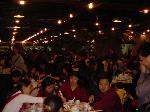- Getting around Lijiang. Dont stay in the Old Towns more than 2 days, there is nothing to do. KRISS Oct 9, 2013 05:46
- 2013 Beijing Temple Fair BENNYLAU Feb 26, 2013 03:29
- Malaysian traveling from KUL - LAX vis Shanghai PVG ZATI_DY Jan 3, 2013 20:15
Where the Food's At
- Views: 3706
- |Vote: 1 0
- |Add to Favorites
- |Recommend to Friends
Steamed Guangzhou
Somewhere below Hubei province in central China, a southbound traveller will see the countryside begin to transform, gradually evolving in character. The hot, dry plains of the north dissolve slowly into the thick, lush jungle climates of Southeast Asia. The air feels heavier with moisture, the smell of fertile earth and leaf litter wafts about you even the larger cities, and the sun presses its heat ever closer, ever mightier the nearer you wander to its equatorial domain.
Guangzhou, right at the bottom of the country, has just that kind of feeling about it, and I sensed it right from the moment I stepped off the plane. I'd never been so far south in China, but as soon as I had smelled the air I recognised that same unmistakably organic quality in the wind that I'd known in Malaysia, much further south than China but certainly having more in common with this region than the Chinese north.
I felt greatly cheered to have reached Guangzhou at last. Historically, most Westerners have seen Guangzhou much earlier than anywhere in the north: much of Guangzhou's modern development has a lot to do with the fact that it is situated very close to Hong Kong, and for the most part of the last century, foreigners were entering China, if at all, via the then British territory. I'd started my China adventures in the historically remote region of Dongbei, and in this sense I'd taken the opposite route. I had read that Guangzhou had become a vibrant cultural cocktail - not so much of international culture, but of the various habits and - importantly - cuisines brought here from around the country by traders taking advantage of the market Hong Kong supplied. Injected with prosperity that was imported as a result of all that trade, Guangzhou grew naturally out of the relationship between Mainland China and her occupied territory.
That prosperity has spread around the province substantially since the opening up policies of the early 80's. Several cities nearby have become relatively wealthy industrial centres, and of course, the border city of Shenzhen - which only began to be built at the time - absorbed the fortune of Hong Kong directly like a kitchen sponge and is now one of the most futuristic looking cities in China.
By contrast, Guangzhou is a complicated, rough, and delightfully energetic city - a hybrid of staunch southern Chinese traditional values and the pretty sins of the well-monied. Guangzhou is excessive, boisterous, as fragrant as much as it reeks and unashamedly so. As my manager and I were driven through the city to my hotel - We'd been invited to give a presentation on education in New Zealand - I saw a place that seemed to be steaming and crowded and much more appealing than the rather more austere cities in the north. Steaming it was - food stalls were everywhere, restaurants were packed despite the late hour, and I reflected that Guangzhou lives up to its reputation as the only place in China that really, really serves food.
Sweet and Sour Guangzhou
We'd been met at the airport by Mr. Bai, who has to be about the wealthiest person I have ever met. Mr. Bai, several years before, had found himself in the enviable position of being a corrupt official, and had managed to secret away enough cash to ensure a lifetime of prosperous excess. He was not a tall man - South Chinese people don't have a reputation for their stature - but his close-cropped hair and feline smile exuded the kind of confidence that comes from ill-gotten wealth. We'd been prepared to pay for our own modest accommodation, but when we had told the car's driver where we here headed, Mr. Bai laughed and gave him alternative directions to a first-class hotel, which he insisted he'd pay for.
The hotel was just as luxurious as it was expensive, but by the time I'd had a chance to have a closer look at my room, I reflected that the facilities were more or less just prettified versions of the same things you'd find in any mid-range hotel - which in turn led me to wonder why so many foreigners insist on five-star accommodation when average Chinese hotels are perfectly adequate.
Mr. Bai, who'd pulled a thick wad of hundred yuan bills from his pocket to cover a couple of nights in the room, was waiting for us in the hotel bar when we'd freshened up. He invited us out for the evening, and asked us to wait for a friend to arrive first. I noticed two mobile phones sitting on the table beside him, and asked why anyone would need more than one. He laughed: "One for my wife, one for my girlfriend". It was the latter who joined us a few moments later, an immaculately decorated, profoundly flat-chested woman who introduced herself as a local TV host. Mr. Bai fingered her hand hungrily and signalled that it was time to leave.
Guangzhou, as the original home of Guangdong Province's prosperity, has all the brightly-lit attractions that any modern city needs to entertain its young and affluent citizens. Mr. Bai would take us on a short tour of some of the most extravagant of these, where tightly-dressed girls were dancing till dawn and the rich were drinking from the top shelf. Mr. Bai's girlfriend became intoxicated very quickly under the influence of her small tumbler of spirits - she placed wet, sticky lipstick marks on Mr. Bai's neck and giggled delightedly. I excused myself under the pretext of using the bathroom, and took the opportunity for a breath of fresh air, which, to me at least, was still thick with the smell of jungle trees. The surrounding nightclub area was as immaculately and unappealingly sculptured as Mr. Bai's girlfriend, but despite this I enjoyed watching the locals wander about the side streets and gardens. Guangzhou people are well known for their casual, friendly character, much in the same way as is said of Beijingers - the difference being that Guangzhou people have a reputation for being far more vibrant than their counterparts in the north, and far more preoccupied with money. The city seemed to reflect this in its architecture - clusters of unhurried, unpretentious towers arranged in ebullient messes around thriving and broad roadways. I couldn't help feeling that Guangzhou was inexpressibly fun.
Guangzhou Steamboat
I had the opportunity, if just for an evening, to really engage in this local spirit more authentically come the following evening. An old friend from Hunan - Connor - had invited me for a meal and I was thankful for a chance to get away from the evil eye of Mr. Bai.
I'd known Connor from his English classes in the city of Jishou, where I'd lived for almost two months, and it was great to see this slender, cheerful individual again in the city where he was beginning to seek his fortunes. He'd been in Guangzhou a year already and described it as practically a foreign country: "I enjoy life here, but I still can't understand the local people", he said sadly. Although already having learnt to understand Cantonese, he was still unable to speak it.
One thing he had happily become familiar with was the cuisine. It's often said that Guangzhou people will eat anything that moves and flies as long as it's not a vehicle. The importance Guangzhou people place on food has given rise to a number of cultural habits commonly observed when eating, some of which were once common throughout the country but which principally survive here, where eating well is tantamount to living.
He led me to a bustling restaurant - an immense cavern of a place crammed with families and friends shovelling food across the big, round tables. This was real Cantonese dim sum - I'd tried the style many times before in different countries, but this was my first time to enjoy it on its home turf. The room was thick with fragrant steam and I was sure our perspiration - Guangzhou's a hot place at the best of times - was as flavoursome as the soup with all the spices that were floating about the room.
We began to select from trolleys of dishes that were being wheeled around the room. Connor poured a cup of hot tea, and reached for a dish in the centre of the table. Without warning, he emptied the entire cup of tea over his plastic chopsticks into the bowl. He advised me to do the same - "the first cup of tea is always too weak", he said. "This makes sure the chopsticks are clean enough to use".
He continued to instruct me in all the secrets of tea etiquette - tapping the table as your teacup is refilled, tipping the lid of the teapot to signal for more hot water. These, and others, have their roots in old Chinese stories, and it's fitting that in Guangzhou - where even in the midst of wealth and modernization a thoroughly traditional China remains - they are still observed today. As Connor and I ate, I began to imagine that Guangzhou must be a great place to live - and as a visitor, it was turning out to be a welcoming and thoroughly enjoyable place. And, just as reputation has it, the food is extraordinary.






 Copyright © 1998-2026 All rights reserved.
Copyright © 1998-2026 All rights reserved.